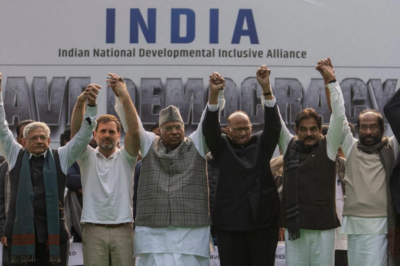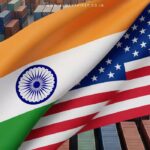
Barely six months ago, the Congress and its INDIA alliance partners celebrated an unexpectedly strong showing in the general elections, successfully preventing the Bharatiya Janata Party (BJP) from securing an outright majority in the Lok Sabha. The upbeat mood was heralded as the “coming of age” for the Opposition, and the Congress, under Rahul Gandhi’s leadership, appeared poised to regain political relevance.
Fast forward to today, the alliance seems to be unraveling amidst bitter recriminations, fractures, and setbacks. Recent electoral defeats—particularly in Maharashtra, which came on the heels of a Congress loss in Haryana—have revealed deeper fissures within the INDIA bloc. Increasingly, Congress’s leadership of the coalition is being called into question by its partners, many of whom have expressed dissatisfaction with the party’s handling of the alliance.
Mamata Banerjee’s Frustration
The most visible sign of discontent came when Trinamool Congress (TMC) leader and West Bengal Chief Minister Mamata Banerjee publicly voiced her frustrations with Congress’s leadership. “I had formed the INDIA bloc and now it is up to those leading the front to manage it. If they can’t run the show, what can I do? I would just say that everyone needs to be taken along,” she said. When asked if she would take charge of the alliance, Banerjee confidently responded, “If given the opportunity, I would ensure its smooth functioning.”
Banerjee’s words struck a chord with several alliance members. The Samajwadi Party (SP) quickly welcomed the suggestion, and Nationalist Congress Party (NCP) MP Supriya Sule praised Banerjee’s potential leadership role, saying, “If she wants to take more responsibility, we will be very happy.” Even Sharad Pawar, the NCP patriarch, stepped in to call Banerjee a “capable leader” while applauding the dedication of her party members in Parliament.
Other INDIA allies, including Uddhav Thackeray’s Shiv Sena (UBT), also praised Banerjee’s governance model in West Bengal. Party spokesperson Priyanka Chaturvedi highlighted Banerjee’s success in keeping the BJP out of power, saying, “Her election experience and fighting spirit are valuable for the INDIA bloc.”
Congress Leadership Under Scrutiny
Adding fuel to the fire, several other stakeholders have voiced concerns about the Congress’s heavy-handed approach. The Communist Party of India (CPI) General Secretary D. Raja openly criticized the Congress, saying the bloc’s functioning was “not smooth,” particularly highlighting Congress’s disregard for seat-sharing demands, which he called “detrimental” to the smaller parties.
Even long-time Gandhi family ally Lalu Prasad Yadav echoed this sentiment, agreeing that leadership of the alliance should be handed over to Banerjee: “Mamata ko de do (Give the responsibility to Mamata).”
At the heart of the crisis lies the Congress’s apparent push to anoint Rahul Gandhi as the face of the alliance. This has created tension among key partners. SP leader Ram Gopal Yadav reignited controversy when he clarified that his party saw Congress president Mallikarjun Kharge as the INDIA bloc’s leader, not Rahul Gandhi. In a now-deleted social media post, Yadav made a stinging remark: “He [Rahul Gandhi] is hell-bent on not mending his ways… The public and opposition parties have given him many chances, but he lacks leadership. At the age of 55, he has a childish mindset.”
This remark came in direct contradiction to statements by UP Congress chief Ajay Rai, who called Rahul the “unifying factor” of the alliance. Rai insisted, “Our leader Rahul Gandhi has been the unifying factor of the grand alliance. So, who else can be a better choice than him to lead it?”
Tensions in Maharashtra: SP Walks Out
Further complicating matters, the Samajwadi Party recently quit the Maha Vikas Aghadi (MVA) alliance in Maharashtra, citing a lack of consultation with allies. State SP chief Abu Azmi criticized the Congress and Shiv Sena (UBT) for their unilateral decisions and perceived betrayal of coalition principles.
He also condemned remarks from Milind Narwekar, a close aide of Uddhav Thackeray, who appeared to glorify the demolition of Babri Masjid. This post, featuring an image of the 1992 demolition, reignited old wounds. Azmi called this stance “unacceptable” and accused the Shiv Sena of backtracking on its commitment to secularism.
“We joined the MVA on the promise of secularism, but now their position seems to have changed,” Azmi said, reaffirming the SP’s decision to exit the alliance.
Congress’s Arrogance and Coalition Troubles
At the root of these ruptures is a common grievance: Congress’s attitude as the self-appointed “big brother” within the alliance. Its allies accuse it of undermining the very spirit of coalition politics—“collective decision-making” and a collegiate approach. The Congress, they argue, continues to carry an air of entitlement stemming from its former dominance, even though its present-day strength is far weaker.
Despite its declining presence on the ground, Congress insists that its nationwide “footprints” entitle it to lead. This has alienated parties like the AAP, which has already announced it will contest alone in the Delhi Assembly elections.
Even on issues like the Adani controversy, the Congress finds itself increasingly isolated, while the alliance partners focus on more pressing local concerns. Its push to return to paper ballots instead of electronic voting machines (EVMs) is seen as a diversionary tactic rather than a cohesive strategy.
Conclusion
The INDIA bloc, initially celebrated as a game-changing coalition, is now at a crossroads, with cracks emerging on multiple fronts. Many alliance members believe Congress has failed to honor its leadership responsibilities, citing a lack of coalition unity and respect for regional players. Whether or not Mamata Banerjee formally takes the reins, the underlying message is clear: Congress must confront its leadership deficiencies and embrace a genuine spirit of cooperation if the INDIA bloc is to have any meaningful future.
In its quest for revival, Congress seems to have overlooked a harsh reality—political alliances thrive on consensus, not coercion. The year 2024 was touted as a year of opposition resurgence. However, with Rahul Gandhi’s “wayward leadership” and Congress’s imperious attitude, the INDIA alliance’s ambitions may unravel faster than they came together.








































Leave a Reply